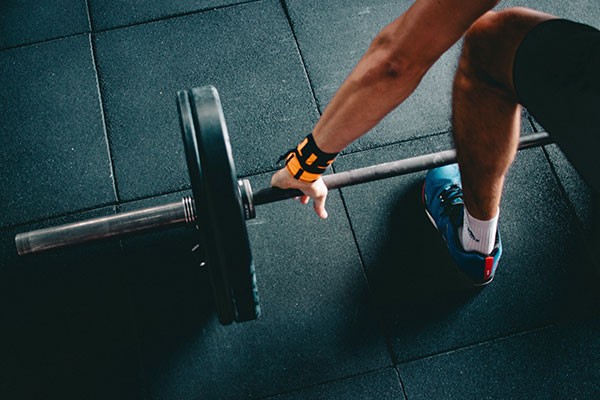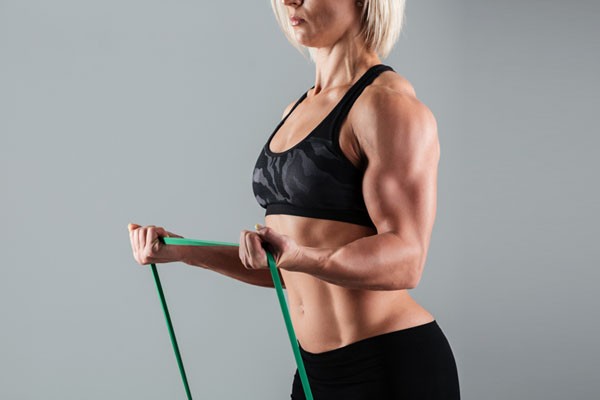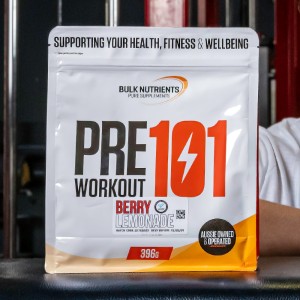Lifting Weights Makes You Live Longer

Lift weights to live longer
This research reviewed a whole group of science papers that examined the relationship between resistance training and all-cause, cardiovascular disease, and cancer mortality. Only studies conducted among non-clinical adult populations who were over 18 years were included.
Ten studies were ultimately selected. So, what did they find?
- Compared with undertaking no resistance training, undertaking any amount of resistance training reduced the risk of all-cause mortality by 15%
- Reduced cardiovascular disease mortality by 19%
- Reduced cancer mortality by 14%
And before you grab your gym bag and head out – the researchers also found that a maximum risk reduction of 27% was observed at around 60 minutes per week of resistance training.
That’s an incredible statistic! It ought to be plastered on the wall of every gym.
I’ll also mention out of the ten studies, only four found that MORE resistance training wasn’t better. For example, doing 2 hours instead of one isn’t superior.
The researchers said this is the strongest evidence to date that resistance training is:
“...associated with reduced risk of all-cause, cardiovascular disease, and cancer-specific mortality. More research is needed to determine whether any potential mortality benefits gained from resistance training diminish at higher volumes.”
So, add potentially a longer life to your list of resistance training benefits!
We await more research to discover the threshold for resistance training and longer life. It might be that after 90 minutes we reach a point of diminishing returns, like what researchers have found with running.
Running for longer life – the threshold
This observational study tracked over 52,000 people for 30 years and found the positive effects of running diminished among people who did more than 32 kilometres per week, more than six days a week, or faster than 12.9 kilometres per hour.
The ideal amount was found to be 8 kilometres to 30 kilometres per week, at 9-11 kilometres per hour, spread throughout three to four sessions per week.
The runners who stuck to these guidelines saw the greatest health benefits: their risk of death dropped by 25 per cent.
Another observational study found weekly running for less than 51 minutes and less than 9.6 kilometres, 1-2 times at less than 9.66 km/h, was sufficient to reduce the risk of mortality, compared with not running.
And compared with non-runners, runners had 30% and 45% lower adjusted risks of all-cause and cardiovascular mortality, respectively, with a 3-year life expectancy benefit.
Amazingly, even 5-10 minutes of running per day at less than 9.6 kilometres was linked to reduced risks of death from all causes and cardiovascular disease.
So, if we’re not overdoing it, we’re actually extending our life span by running, too. Any more than this is actually detrimental to the male aorta; ageing it by up to ten years. However, the same isn’t seen in women.
But back to resistance training, and it might not just help extend our life span but improve the quality of our later years, too.

Resistance training and sarcopenia
Starting as early as our 40s, we're at risk of developing sarcopenia; loss of muscle tissue and function. This makes things as simple as walking difficult.
But we can combat muscle wastage with resistance training.
And for the elderly, the best way to bolster muscle tissue and strength in the elderly is with progressive resistance training.
Although, cycling and even dancing can help, too!
And aerobic training (running) is only a minor solution to sarcopenia long-term, so it's recommended we include resistance training weekly!
No matter how old you are, it's best to get into the habit of resistance training as early as you can; fighting sarcopenia when it has already settled in is a lot harder.
Another benefit is resistance training's effect on bone density. Stronger bones will assist in a better quality of life!

Weight lifting will help us stress less, too
FACT: Exercise helps us deal with stress better.
In the modern digital era, some of us have seen our working hours increase which can exacerbate stress.
And research has found exercise to create less stress in many populations; as extreme as veterans suffering from PTSD, athletes, and the aforementioned everyday person.
Scientists also report that those who exercise regularly experience fewer daily hassles.

In summary, this new study into resistance training and longevity
Finds a positive correlation. Compared with undertaking no resistance training, pumping iron reduces the risk of all-cause mortality by 15%, cardiovascular disease mortality by 19%, and cancer mortality by 14%.
A maximum risk reduction was observed at around 60 minutes per week of resistance training. More research is needed to determine whether any potential mortality benefits gained from resistance training diminish at higher volumes.
References:
- Babyak M, Blumenthal JA, Herman S, et al. Exercise treatment for major depression: maintenance of therapeutic benefit at 10 months.PsychosomMed. 2000;62(5):633–8.
- Buckley TC, Mozley SL, Bedard MA, et al. Preventive health behaviors, health-risk behaviors, physical morbidity, and health-related role functioning impairment in veterans with post-traumatic stress disorder. Mil Med. 2004;169(7):536–40.
- Craft LL, Landers DM. The effect of exercise on clinical depression and depression resulting from mental illness: a meta-analysis. J SportExercPsychol. 1998;20(4):339–57.
- de Assis MA, de Mello MF, Scorza FA, et al. Evaluation of physical activity habits in patients with posttraumatic stress disorder. Clinics. 2008;63(4):473–8.
- Dunn AL,TrivediMH, O’Neal HA. Physical activity dose-response effects on outcomes of depression and anxiety. Med Sci Sports Exerc. 2001;33(6):S587–97.
- Effects of resistance- and flexibility-exercise interventions on balance and related measures in older adults. Bird ML, Hill K, Ball M, Williams AD. J Aging Phys Act. 2009 Oct; 17(4):444-54.
- Friedenreich CM. Physical activity and cancer prevention: from observational to intervention research. Cancer Epidemiol Biomarkers Prev. 2001;10(4):287–301.
- Ginis KAM, Latimer AE, McKechnie K, et al. Using exercise to enhance subjective well-being among people with spinal cord injury: the mediating influences of stress and pain.RehabilPsychol. 2003;48(3):157–64.
- Jonsson D, Johansson S, Rosengren A, et al. Self-perceived psychological stress in relation to psychosocial factors and work in a random population sample of women. Stress Health. 2003;19(3):149–62.
- King AC, Taylor CB, Haskell WL. Effects of differing intensities and formats of 12 months of exercise training on psychological outcomes in older adults. Health Psychol. 1993;12(4):292–300.
- Knab AM, Nieman DC, Sha W, et al. Exercise frequency is related to psychopathology but not neurocognitive function. Med Sci SportsExerc. 2012;44(7):1395–400.
- Lambiase MJ, Barry HM, Roemmich JN. Effect of a simulated active commute to school on cardiovascular stress reactivity. Med Sci SportsExerc. 2010;42(8):1609–16.
- Long BC. Aerobic conditioning and stress reduction: participation or conditioning? Hum Mov Sci. 1983;2(3):171–86.
- Mc Namara K, Alzubaidi H, Jackson JK. Cardiovascular disease as a leading cause of death: how are pharmacists getting involved? Integr Pharm Res Pract. 2019 Feb 4;8:1-11. doi: 10.2147/IPRP.S133088. PMID: 30788283; PMCID: PMC6366352.
- McHugh JE, Lawlor BA. Exercise and social support are associated with psychological distress outcomes in a population of community-dwelling older adults. J Health Psychol. 2012;17(6):833–44.
- Nguyen-Michel ST, Unger JB, Hamilton J, et al. Associations between physical activity and perceived stress/hassles in college students. Stress Health. 2006;22(3):179–88.
- Salmon P. Effects of physical exercise on anxiety, depression, and sensitivity to stress: a unifying theory. Clin Psychol Rev. 2001;21(1):33–61.
- Santilli V, Bernetti A, Mangone M, Paoloni M.Clinicaldefinition of sarcopenia. Clin Cases Miner Bone Metab. 2014;11(3):177-180.
- Shailendra P, Baldock KL, Li LSK, Bennie JA, Boyle T. Resistance Training and Mortality Risk: A Systematic Review and Meta-Analysis. Am J Prev Med. 2022 May 19:S0749-3797(22)00176-3. doi: 10.1016/j.amepre.2022.03.020. Epub ahead of print. PMID: 35599175.
- SkirkaN. The relationship of hardiness, sense of coherence, sports participation, and gender to perceived stress and psychological symptoms among college students. J Sports Med Phys Fitness. 2000;40:63–70.
- Stampfer MJ, Hu FB, Manson JE, et al. Primary prevention of coronary heart disease in women through diet and lifestyle. N Engl J Med. 2000;343(1):16–22.
- Taylor-PiliaeRE, Fair JM, Haskell WL, et al. Validation of the Stanford Brief Activity Survey: examining psychological factors and physical activity levels in older adults. J Phys Act Health. 2010;7(1):87–94.
- The effects of aging, physical training, and a single bout of exercise on mitochondrial protein expression in human skeletal muscle. Bori Z, Zhao Z, Koltai E, Fatouros IG, Jamurtas AZ, Douroudos II, Terzis G, Chatzinikolaou A, Sovatzidis A, Draganidis D, Boldogh I, Radak Z Exp Gerontol. 2012 Jun; 47(6):417-24.
- Theorell-HaglowJ, Lindberg E, Janson C. What are the important risk factors for daytime sleepiness and fatigue in women? Sleep. 2006;29(6):751–7.
- Walston JD. Sarcopenia in older adults. CurrOpinRheumatol. 2012;24(6):623-627. doi:10.1097/BOR.0b013e328358d59b
- Yoo SZ, No MH, Heo JW, et al. Role of exercise in age-related sarcopenia. J ExercRehabil. 2018;14(4):551-558. Published 2018 Aug 24. doi:10.12965/jer.1836268.134















































